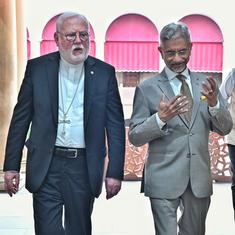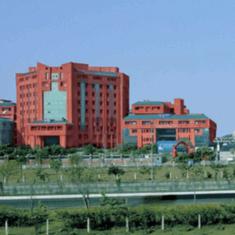Palestinians have been denied right to their homeland, says S Jaishankar amid Israel’s war on Gaza
The external affairs minister, however, reiterated that Hamas’ October 7 attack on Israel was ‘terrorism’.

External Affairs Minister S Jaishankar on Wednesday said a response to Israel’s ongoing war on Gaza must take into account that the Palestinian people have been “denied the right to their homeland”.
Jaishankar, who was on a visit to Malaysia, said that while Palestinian militant group Hamas’ October 7 attack on Israel was “terrorism”, any response to it must take humanitarian law into account.
“Countries may be justified in their own minds in responding, but you cannot have a response that...every response must take into account something called international humanitarian law,” the foreign minister said while interacting with the Indian community in Malaysia
He added: “The fact is whatever the rights and wrongs of the issue, there is underlying issue of the rights of the Palestinians and the fact that they have been denied their homeland.”
Israel’s war on Gaza began after Hamas’ incursion into southern Israel on October 7 that killed 1,200 people. The militant group had also taken over 200 people hostage. Some of the hostages were released in November as part of a brief ceasefire agreement in exchange for Palestinians imprisoned by Israel and humanitarian aid.
Since October, Israel has been carrying out unprecedented air and ground strikes on Gaza. The attacks have killed nearly 33,000 people, including more than 13,000 children, according to Al Jazeera. Nearly 75,000 people have been left injured.
Although the ongoing war began nearly six months ago, the roots of the Israel-Palestine conflict go back to the 1940s.
India’s position
A “two-state” solution has been India’s long-standing view on the conflict.
After the war broke out, foreign ministry spokesperson Arindam Bagchi had said on October 12: “India always advocated the resumption of direct negotiations towards establishing a sovereign, independent and viable state of Palestine, living within secure and recognised borders, side by side at peace with Israel”.
In November, India voted in favour of a United Nations resolution condemning Israeli settlements in Palestine.
The UN resolution condemned “the disruption of the livelihood of protected persons, the forced transfer of civilians and the annexation of land, whether de facto or through national legislation”.
It further reaffirmed that the Israeli settlements in Palestine were “illegal and an obstacle to peace and economic and social development”.
In February, Jaishankar said that “India has long believed in a two-state solution”.
“We have maintained that position for many decades and, I think, today many more countries in the world feel not just that the two-state solution is necessary, but it is more urgent than it was before,” he said, reported PTI.
On March 23, Jaishankar reiterated the two-state solution to resolve the ongoing Israel-Palestine conflict while he was on a three-day visit to Singapore.
Also read: Why there is no legal basis for India’s crackdown on pro-Palestine protests









